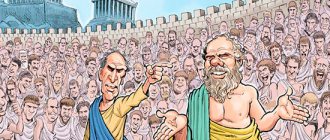One of the most convincing techniques of oratory is sophistry. The term “sophism” comes from the Greek sophisma “skill, skill, cunning invention, trick, wisdom” and is a kind of logical conclusion that proves an absurd or paradoxical statement that contradicts generally accepted objective truth. One of the most convincing techniques of oratory is sophistry.
The creators of sophisms are considered to be a group of ancient Greek philosophers of the V-IV centuries. BC, the so-called sophists. The sophists positioned themselves as paid teachers of wisdom (Sophia - Greek “wisdom”), whose activity was to teach philosophy, logic and, especially, rhetoric (the science and art of eloquence) to everyone. One of the main goals of the sophists was to instill in a person the skills of mastery of debate: to teach to prove (confirm or refute) any thought, without caring about the objective truth of the statement, to emerge victorious from an intellectual competition.
The most famous representatives of the direction of sophistry in Ancient Greece were Protagoras of Abdera, Gorgias of Leontine, Hippias of Elis, Prodicus of Keos, Antiphon, Critias of Athens.
In the course of their activities, they invented various methods of arguing: logical, rhetorical and psychological. The concept of sophistry refers to logical techniques of deliberately dishonest but successful discussion. However, the sophists well understood that using only sophistry in a dispute is not enough for a victorious outcome, because even if one is fluent in the art of sophistry, the interlocutor is not able to resist objective truth, and therefore risks losing the debate. To solve this problem, the sophists began to propagate their philosophical idea that no objective truth exists: there are as many truths as there are people. The Sophists argued that everything in the world is subjective and relative. Sophistry presupposed the recognition of this idea as fair, which helped the followers of sophistic art to achieve victory in any discussion: the winner is not the one who is on the side of truth, but the one who is better at the oratorical techniques of polemics. One of the creators of sophisms, Protagoras, argued that the task of a sophist is to present the worst argument as the best through the use of cunning tricks in speech, in reasoning, caring not about the truth, but about success in the argument or practical benefit. Protagoras was helped to reinforce this idea by the “criterion of foundation” he formulated, which consists in the fact that a person’s opinion is the measure of truth.
Back in the 5th century. BC. Philosophers appeared who did not agree with the ideas of sophistry and conducted constant polemics with them. One of the ideological opponents of the Sophists was the famous Greek philosopher Socrates, who believed that objective truth exists, but it is not known for sure what it is, what it is, therefore the search for objective truth is the primary task of every thinking person.
Followers of both theories still exist today: many of our contemporaries, agreeing with the sophists, believe that everything is relative and subjective, that nothing objective and generally valid exists. Their main argument is “how many people, so many opinions.” However, there are many people who, following the thought of Socrates, believe in the existence of a single truth for everyone, in objective things, such as the sun in the sky. Despite the fact that there is someone who has turned away or closed his eyes and does not see, does not notice the sun in the sky, this does not mean that it is not there, that this objective truth does not exist.
Sophistry captivates the interlocutor with its apparent persuasiveness, which is achieved by the fact that outwardly the proof of a thought looks correct, but with the slightest logical analysis one can clearly identify false elements and errors hidden in sophism. The concepts of sophism and paralogism (Greek paralogismus - incorrect reasoning) should not be confused: their main difference is that sophistry deliberately hides logical errors in order to convince the interlocutor that the speaker is right, while paralogisms imply logical violations made involuntarily, due to ignorance , the speaker’s inattention, but leading him to deliberately incorrect conclusions.
The difference between sophism and paralogism
Before considering specific examples of sophistry, it is necessary to note: any of them constitutes an error. In addition to these philosophical tricks, there is also such a thing in logic as paralogism. Its difference from sophism is that paralogism is allowed by accident, while sophistry is a deliberate error. The speech of many people is practically replete with paralogisms. Even if a conclusion is constructed in accordance with all the laws of logic, then at the very end it can be distorted and no longer correspond to reality. Although paralogisms are allowed without malicious intent, they can still be used for personal gain - sometimes called tailoring.
Literature
- Akhmanov A. S., Aristotle’s logical doctrine, M., 1960;
- Brutyan G. Paralogism, sophistry and paradox // Questions of Philosophy. 1959. No. 1. P. 56-66.
- Bradis V.M., Minkovsky V.L., Elenev L.K., Errors in mathematical reasoning, 3rd ed., M., 1967.
- Bilyk A. M., Bilyk Ya. M. On the issue of the problematic technique of sophistry (its connection with the modern understanding of a scientific problem) // Philosophical Sciences. No. 2. 1989. - P.114-117.
- Lapshin I.I.
Sophism // Encyclopedic Dictionary of Brockhaus and Efron: in 86 volumes (82 volumes and 4 additional). - St. Petersburg, 1890-1907. - Morozov N.A. On the scientific significance of mathematical sophisms // Proceedings of the Scientific Institute named after. P. F. Lesgaft. Pg., 1919.T.1.S.193-207.
- Pavlyukevich V.V. Logical and methodological status of sophisms // Modern logic: problems of theory, history and application in science. St. Petersburg, 2002. pp. 97-98.
- Read, Stephen (ed.): Sophisms in Medieval Logic and Grammar, Acts of the 8th European Symposium for Medieval Logic and Semantics, Kluwer, 1993
- Cassagnac, Joachim.: Merde à Celui qui le lira, Flammarion, 1974
- Tulchinsky M. E. Entertaining problems-paradoxes and sophisms in physics. M. 1971.
- Nerkararyan K.V., Sophisms and paradoxes, 1st edition, 2001
Interesting examples of sophistry
Unlike paralogism, sophistry is a deliberate violation of the laws of logic. At the same time, sophisms are carefully disguised as true conclusions. There are many similar examples that have survived from antiquity to the present day. And the conclusion of most of these tricks has a rather curious connotation. For example, this is what the sophism about a thief looks like: “A thief has no desire to steal something bad; acquiring something good is a good deed; therefore, the thief is doing a good deed.” The following statement also sounds funny: “The medicine that a patient needs to take is good; the more good, the better; therefore, you need to take as much medicine as possible.”
Another interesting example of sophism is the famous conclusion about Socrates: “Socrates is a man; the concept “man” is not the same as the concept “Socrates”; Therefore, Socrates is something other than Socrates.” Such sophisms were often used in Ancient Rome in order to mislead their opponents. Not being armed with logic, the sophists' interlocutors could do absolutely nothing to oppose these tricks, although their absurdity was obvious. Disputes in ancient Rome often ended in bloody fights.
Sources and fragments of classical sophistry
No complete works have survived from most of the ancient Greek sophists, but only fragments or testimonies. Only the following texts have been preserved in more or less complete form:
- Gorgias
.
Two speeches have survived: “Praise of Helen” and “Defense of Palamedes.” Currently, these speeches are considered false. [ source not specified 68 days
] - Antiphon
. The question of the identity of Antiphon the sophist and Antiphon the orator is debated. The second belongs to several speeches (the so-called “tetralogy”), and the first - a fragment of the essay “Truth”. - Critias
. Through Sextus Empiricus, a fragment of the text “Sisyphus” has reached us. According to most modern researchers, this text does not belong to Critias. - Double speeches (English)Russian. anonymous author.
The main ancient sources about the Sophists are Plato, Aristotle, Diogenes Laertius, Flavius Philostratus and others.
All fragments and evidence about the sophists are collected in the work of Diels-Krantz. Translated into Russian only once by Makovelsky. The translation was often carried out from German, but is currently considered outdated and subject to criticism.
Tricks from mathematics
There are many known examples of mathematical sophisms. To obtain them, authors already unknown to us manipulated the values of the numbers so as to obtain the desired result. For example, you can prove that 2 x 2 = 5. This is done this way: 4 is divided by 4, and 5 by 5. Therefore, the result comes out like this: 1 / 1 = 1 / 1. Which means 4 = 5 , and 2 x 2 = 5. Resolving this example of sophism in mathematics is very simple - you need to subtract two different numbers, then identify the inequality of these two numbers.
One always had to keep one's ears open with the sophists. Among them were many wise philosophers. They masterfully mastered the art of argument and came up with mental tricks that are used to this day not only by lovers of philosophy, but also by politicians.
Notes
- Sophists / A.F. Losev // . - M.: Soviet Encyclopedia, 1969-1978. - (: / chief editor A. M. Prokhorov; 1969-1978).
- Anthology of world philosophy: in 4 volumes. Vol. 1, part 1: Philosophy of antiquity and the Middle Ages Ed. board: V.V. Sokolov (editor-compiler) and others. - M.: Mysl, 1969. - P. 315.
- Plato. Gorgias / Collected works in 4 volumes, T. I - M.: Mysl, 1990. - P. 489.
- ↑
- Plato "Protagoras"
- Diogenes Laertius
. About the life, teachings and sayings of famous philosophers - M., 1986. - P. 348−349. - Lebedev A.V.
// New philosophical encyclopedia / Institute of Philosophy RAS; National social-scientific fund; Pred. scientific-ed. Council V. S. Stepin, deputy chairmen: A. A. Guseinov, G. Yu. Semigin, student. secret A. P. Ogurtsov. — 2nd ed., rev. and additional - M.: Mysl, 2010. - ISBN 978-5-244-01115-9. - Complete Works of Diogenes Laertius (Delphi Ancient Classics Book 47) - Delphi Classics, 2015
- Sextus Empiricus. Against the logicians, book. VII /Works in 2 volumes. T.1. - M.: Mysl, 1975. - P. 72-73.
- Sextus Empiricus. Against the logicians, book. VII / Works in 2 volumes. T.1. - M.: Mysl, 1975. - P. 70-71.
- Sextus Empiricus. Against the logicians, book. VII / Works in 2 volumes. T.1. - M.: Mysl, 1975. - P. 73.
- Marx K., Engels F. Works. 2nd ed. - T. 1. - P. 99.
- DK 74 B 4
- Canto-Sperber M.
Greek philosophy. Pre-Socratics.. - 2006. - T. 1. - ISBN 978-5-87245-121-0.
Other examples
There is also a well-known example of a trick about a crocodile that stole a child. The crocodile promised the child's father that he would return him if he guessed whether the crocodile would return the baby or not. The question in this dilemma is: what should the crocodile do if the father says that the crocodile is not going to return the child to him?
The sophism about a pile of sand is also known. One grain of sand is not a heap of sand. If n grains of sand do not form a heap of sand, then n + 1 grains of sand do not form a heap either. Therefore, no amount of grains of sand can form a pile of sand.
Another sophism is called “The Almighty Wizard.” If a wizard is omnipotent, can he create a stone that he cannot lift? If he can perform such witchcraft, then this wizard is not omnipotent, because he will not be able to lift this stone. And if he doesn’t succeed, then he’s still not omnipotent. After all, he cannot create such a stone.
Peculiarities of the teachings of the “younger” sophists
This part of the history of sophistry has not been preserved very well, so there is little reliable information about the “younger” sophists. Famous representatives of the movement were Lycophron, Alcidamas, Thrasymachus, Callicles and Critias. Their ideas were based on the following theses:
- there should be no barrier between social classes;
- elite is an artificial concept, an invention of a group of people;
- nature created every person free, there should be no slavery.
The younger sophists talked a lot about ethics and morality, as well as about freedom and rights. In particular, Thrasymachus supported the ideas of democracy, extolled atheism and criticized religions.
Sophistry "Epimenides"
Above were examples of sophistry with answers. However, there are also tricks that you can struggle with in vain for years, but still not find the right answer. The thinker will walk in a vicious circle, but will not be able to find the key to this riddle. An example of sophism that cannot be solved is told about the Cretan Epimenides. One day he said the phrase: “All Cretans are liars.” But the philosopher himself was also a resident of Crete. So he was lying too.
Prerequisites for the emergence
In 146 BC. e. Hellas became dependent on the Roman Empire. Gradually, Greek culture became more and more closely intertwined with Roman culture. This concerned not only literature, but also music, architecture, even in religious matters, the influence of Greece at that time was enormous and extended to most of the empire. In the 1st and 2nd centuries AD. e. In Greece and Rome, the prerequisites arose for the revival of oratory and the education system in general; this surge is largely due to the intertwining of both cultures. Rome began to encourage study in Athens and other Greek cities, which allowed Greek philosophers to feel greater freedom and self-confidence, as learned Greeks began to be considered an honorable part of the society of the empire, but retained their cultural identity. The development of philosophical thought in Rome allowed the Romans to consider themselves among the heirs of ancient Greek philosophy. Thus, the second sophistry allows us to talk about the emergence of Greco-Roman culture. Knowledge of two languages during this period becomes an important sign of education.
The paradox of the Cretan and the fate of the unfortunate philosophers
But if Epimenides is lying, does that mean his statement is true? But then he is not a resident of Crete. However, according to the condition of sophism, Epimenides is a Cretan, which means... All this means only one thing - the thinker will have to walk in a vicious circle again and again. And not only him. It is known that the Stoic Chrysippus wrote three books devoted to the analysis of this example of sophism. His famous colleague named Philetus of Kos was unable to overcome the logical problem and committed suicide.
And the famous logician Diodorus Kronos, already in his old age, made a vow not to eat until he managed to solve this problem. Diogenes Laertius writes about this incident. According to the historian, when the sage Diodorus was at the court of Ptolemy, he was asked to solve this sophism. Since the philosopher could not cope with him, Ptolemy nicknamed him Kronos (in translation, this word not only means the name of the ancient god of time, but also simply “fool, blockhead”). There were rumors that Diodorus died either from hunger, or because he could not withstand such shame. Thus, taking sophistry too seriously cost someone their life. However, you should not be like the ancient philosophers and take sophisms too seriously. They are good exercises for developing logic, but they are not worth risking your career, much less your life.
Sophistry as philosophy
The sophists, being “teachers of wisdom,” studied not only political and legal issues, but also the problems of philosophy.
Sophistry concentrated its interest on social topics, on issues of communication and on man. She studies public speaking, politics, philosophical knowledge and concrete sciences.
In their desire for persuasiveness, they reached the conclusion that it was possible, and even necessary, to prove anything, or to challenge it. It all depended on what was needed at the moment. And this became the source of indifference to the veracity of evidence and challenges.
Thus, methods of argumentation were formed that came to be called sophisms. And the sophists, as people with education and intelligence, knew very well that they could theoretically prove whatever their heart desired.
School of Sophists
The Sophists were itinerant professional teachers and intellectuals who visited Athens and other Greek cities in the second half of the fifth century BC.
For payment, the Sophists offered young wealthy Greek men an education in areté (virtue or excellence), thereby achieving wealth and fame, but also causing great antipathy.
Until the fifth century BC, the quality of arete was predominantly associated with aristocratic warrior virtues such as courage and physical strength.
However, in democratic Athens in the late fifth century BC, arete increasingly came to be understood as the ability to influence one's fellow citizens in political assemblies through rhetorical persuasion.
Thus, sophistic education grew beyond its usual boundaries and took advantage of this change.
Famous representatives of the sophistic movement are Protagoras, Gorgias, Prodicus and Thrasymachus.
Special Doctrines of Sophistry
The English historian George Grote (1794-1871) argued that the sophists had nothing in common with each other except their profession as paid teachers teaching young people.
The Sophists were not a sect with a set of binding beliefs or doctrines. But they had a common interest in a range of issues where they sought to apply decisions according to certain, clearly established principles.
Theoretical issues
Relativism and skepticism have often been seen as common features of the sophistic movement as a whole. But it was previously pointed out that only Protagoras and Gorgias have any indication of a radical skepticism of the possibility of knowledge.
One of the most famous doctrines associated with the Sophistic movement was the opposition between nature and law or moral convention. It is probable that this opposition did not originate in sophistic circles, but rather originated earlier, but it was clearly very popular and figured mainly in sophistic discussions.
This most widespread doctrine included a call to move from ordinary laws to supposedly “higher” laws based on nature.
Sometimes these "higher" laws were used to correct deficiencies in existing laws and to introduce stricter obligations. But usually it was in order to free a person from restrictions unjustifiably imposed by laws created by society.
Reason, obstacle
Frédéric Bastiat is the author of some of the most widespread sophisms. Among them, the violation of the logic “reason, obstacle” is quite well known. Primitive man was very limited in his capabilities. Therefore, in order to obtain any thing and result, he had to solve many problems.
If we consider a simple example of overcoming a distance, we can see from it that it is difficult for a person to independently overcome all the barriers that may arise on the path of any single traveler. We live in one where the problem of overcoming obstacles is dealt with by people who specialize in this type of activity. And these people managed to make such obstacles one of their main sources of income.
The appearance of any new obstacle puzzles many people who are trying to overcome it. Therefore, the presence of obstacles is unthinkable for modern society, because they provide the opportunity to enrich each person individually, and, therefore, the entire society as a whole.
History of the term
Sophisms and paradoxes have been noticed since ancient times. One of the fathers of philosophy, Aristotle, called this phenomenon imaginary evidence that appears due to a lack of logical analysis, which leads to the subjectivity of the entire judgment. The persuasiveness of the arguments is just a disguise for a logical error, which undoubtedly exists in every sophistic statement.
Sophistry - what is it? To answer this question, we need to consider an example of an ancient violation of logic: “You have what you did not lose. Lost antlers? So you have horns." There is an omission here. If the first phrase is modified: “You have everything you haven’t lost,” then the conclusion becomes true, but rather uninteresting. One of the rules of the first sophists was the statement that it is necessary to present the worst argument as the best, and the goal of the dispute was only victory in it, and not the search for truth.
The Sophists argued that any opinion could be legitimate, thereby denying the law of contradiction later formulated by Aristotle. This gave rise to numerous types of sophisms in different sciences.










